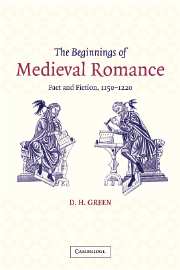Book contents
- Frontmatter
- Contents
- Preface
- List of abbreviations
- 1 Defining twelfth-century fictionality
- 2 Vernacular fiction in the twelfth century
- 3 Fictive orality
- 4 Fiction and Wolfram's Parzival
- 5 Fiction and structure
- 6 Fiction and history
- Notes
- Bibliography
- Index of names
- CAMBRIDGE STUDIES IN MEDIEVAL LITERATURE
2 - Vernacular fiction in the twelfth century
Published online by Cambridge University Press: 22 September 2009
- Frontmatter
- Contents
- Preface
- List of abbreviations
- 1 Defining twelfth-century fictionality
- 2 Vernacular fiction in the twelfth century
- 3 Fictive orality
- 4 Fiction and Wolfram's Parzival
- 5 Fiction and structure
- 6 Fiction and history
- Notes
- Bibliography
- Index of names
- CAMBRIDGE STUDIES IN MEDIEVAL LITERATURE
Summary
Because of the historical variability of the concept and practice of fiction the definition attempted in the last chapter was meant to be applicable to a relatively short timespan on either side of 1200. Not merely does fiction vary across cultures, it is also changeable over time within one culture and between literary genres (which is why we are to concentrate on the romance). Within the romance attention has been drawn to different features that make up its fictionality and emerge at different times, not all at once, so that the process of fictionalisation is a gradual one. We must avoid a revolutionary model, positing a ‘discovery’ of fiction once and for all rather than the possibility that different conditions may encourage its emergence (and its loss) at different times. This suggests the relevance of the first section of this chapter, namely the possibility that vernacular fiction in the twelfth century may have had predecessors.
PREDECESSORS
The emergence of fictionality amongst the Greeks has been treated by Rösler in terms of the interplay between orality and writing. The early Greek poets, like their critics, held that poetry should tell the truth, as befits an oral culture in which the task of poetry was to transmit traditional lore, but with the advent of writing this gradually changed and the possibility of fiction arose. How this new possibility was reflected in Greek theory we have seen briefly with Plato (negatively) and Aristotle (positively).
- Type
- Chapter
- Information
- The Beginnings of Medieval RomanceFact and Fiction, 1150–1220, pp. 18 - 34Publisher: Cambridge University PressPrint publication year: 2002



